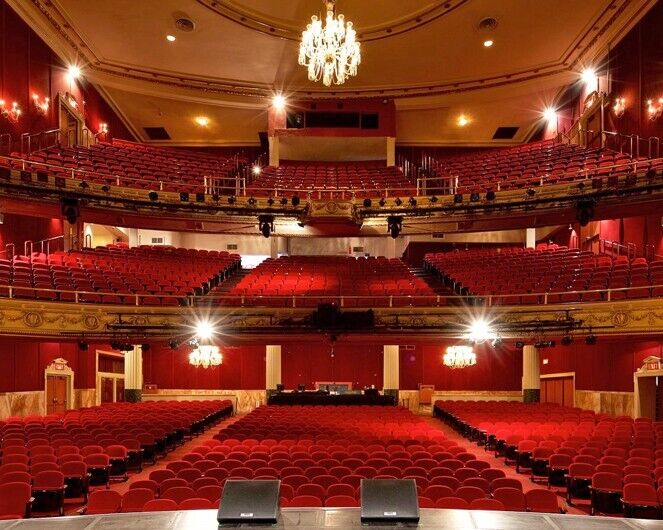On Sunday, December 22nd, 2024, CBS will broadcast the 47th Kennedy Center Honors. Several creators and entertainers will be honored including American rock band the Grateful Dead, blues singer and songwriter Bonnie Raitt, movie director & filmmaker Francis Ford Coppola, and Jazz trumpeter and pianist, Arturo Sandoval. Also being celebrated is the Harlem landmark, The Apollo Theater. But the Apollo Theater is different. This is the first time in Kennedy Centers Honor history that a specific place or venue has been honored as an American Institution. Savion Glover tap-danced and Dave Chappelle gave recounts of being booed on amateur night as a 16-year-old start up comic. Queen Latifah, who’s performed at the Apollo Theater many times, will host the event.
But let’s rewind a bit. Actually, let’s do 90+ years of rewinding to see why The Apollo Theater is so prestigious. I, like others grew up watching “Showtime at the Apollo” on TV late Saturday nights in the 1990s. Waiting for your favorite singer to open the show and of course the famed Amateur Night to see if the previous weeks winner could take home the crown again. My favorite moments would be the lady in the front row, throwing herself at the headliner and of course, who could forget ‘Sandman’ Sims dancing away a not so prepared contestant. You see, ‘Sandman’ Sims comes from an era of the Apollo Theater (and Black performers in general) in which the theater was highly celebrated as a cultural phenomenon. It was our only means to see the best performers of the day put on a show. We’ve all heard the saying “If you can make it in New York, you can make it anywhere.” Well for Black entertainers, that means the Apollo Theater on 125th Street in Harlem, New York City.
While the theater originally opened in 1913, it wasn’t until 1934 when Black performers became the main attraction. Early performances were by vaudeville acts like the comedy team ‘Buck & Bubbles’ and acrobatic dancers like the Nicholas Brothers and the Berry Brothers. Big brass jazz bands led by Cab Calloway and blues singers like Ethal Waters in the 1940s would make way for the Rock & Roll and Rhythm & Blues Revue shows that ran through the late 1960s. The leading performers of the day would showcase their talent at the Apollo Theater with up to six acts performing for a week multiple times a day. The sound of Motown to comics like Redd Foxx and Flip Wilson would headline or MC. Our first taste of a live Apollo show (if you were not in Harlem) was a 1955 television special titled “Rhythm & Blues Revue.” Musicians, comedy acts, dancers, and singers, performed on the same show.

Apollo eventually became the leading source for African American entertainment in a series of theaters
hosting Black performers known as the Chitlin Circuit. These theaters included the Regal in Chicago,
Illinois, The Howard in Washington DC, The Royal in Baltimore, Maryland, and The Uptown in
Philadelphia, Pennsylvania. Those were just a few but they were the biggest names in theaters you’d
play on the circuit with Apollo leading the way.
A lot of these headliners begin as contestants through their amateur night showcase. Amateur
Night began in 1933 at the nearby Lafayette Theater by Ralph Cooper before he moved it to the Apollo
the following year. Wednesday Night’s Amateur Showcase was so popular at that time it was broadcast
on WMCA radio station. Everyone from the previous mentioned Sandman Sims (who won a record 25
times!) to Joe Tex and Jimi Hendrix won Amateur Night at the Apollo. Ella Fitzgerald, Sarah Vaugan, Ruth
Brown, Gladys Knight, and D’Angelo are some of the famed names to walk away as a winner.
As the 1960’s turned into the 70’s, previously mentioned theaters The Regal, The Howard, The Royal, and The Uptown stopped holding revues and eventually shut down. Even a few of them were demolished by the mid-1970s. Performers like the Supremes were able to obtain gigs at other venues and play to non-segregated crowds as the Chitlin circuit theaters were scarce. Yes, even the Apollo went through its hard times. After closing the doors for a few years,

The Apollo Theater celebrated its 50th year with a TV Special titled ‘Motown at the Apollo’ in 1985. It was the front runner for the syndicated television series “Showtime at the Apollo,” which debuted in 1987 and occasionally still airs specials from time to time. Host like Sinbad and Steve Harvey introduced amateurs and professionals to the world. Even a spinoff, “The Apollo Comedy Hour,” came on the heels of the hot early 90s run of shows like The Arsenio Hall Show, In Living Color, and Def Comedy Jam.
Comedy specials and live music albums have taken place at the Apollo. Chris Rocks’ award winning
‘Bigger & Blacker’ was recorded in 1999. The king of recorded material at the Apollo is the Godfather
of Soul, James Brown. He’s recorded five albums at the Apollo, his first being the influential 1962
recording, “Live at the Apollo.” It spent 66 weeks on the Billboard Hot 100 Charts peaking at number 2
and started the influx of live R&B and Soul albums to come.
The Apollo’s influence is still felt to this day. When you think of current long running and past television
series like Star Search, The Gong Show, American Idol, So You Think You Can Dance, and America’s Got
Talent, The Apollo Theater’s Amateur Night was doing this decades before.
The Apollo Theater still holds Amateur Night Wednesdays and you can tour the hallowed theater for a
history lesson in Black entertainment.